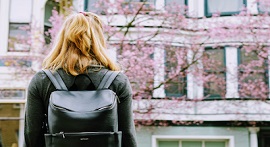Academics
One of the City University of New York’s senior colleges, Baruch College’s schools (Weissman School of Arts and Sciences, Marxe School of Public and International Affairs, and the Zicklin School of Business, which is the largest of the three) are located in Manhattan and take full advantage of being in “the greatest city of the world”: students here have access to “internships, big companies, and...Wall Street.” Low in-state (as well as reasonable out-ofstate) tuition means that many here “go to school while already working in interesting and impressive positions,” and have come to Baruch purely “to improve themselves,” which increases the level of maturity in the classroom. There is a wide variety of courses (“especially [for] those interested in business”), and the school offers ad-hoc majors, which allows students to design programs that will support their career goals.
Though this is not a research university, there are a “vast amount of resources” that are available to the students here. The education system is “well organized and up to date with the current world,” and Baruch is tied with many companies in New York, which “creates even more opportunities for internships as well as job opportunities.” “Some of my business professors came from leading huge corporations, and their anecdotes about their prior work help students internalize the material,” says one student. There is “an impressive number of careerdeveloping programs on campus that are free of charge and readily available to all students,” and “it is clear that the professors at Baruch have first-hand experience in the material they are teaching to students.”
Student Body
Students come from all over the world and Baruch is “full of bright and ambitious minds”; being a student here “means you learn to interact with peers from all over the world.” “My fellow peers have a good sense of where they want to steer their careers and exactly what they want to do after college,” says one student. Baruch is “full of first-generation college graduates,” and the school is a real microcosm of NYC: “the hustle and bustle, crowds, everyone has somewhere to go, and everyone has a dream they hope will one day be fulfilled.” This is a very unique commuter school in that “it has such an involved student body” where “there is a sense of community through clubs and extracurriculars.”
Campus Life
As a commuter school, most students go to classes and go home, but “there are great clubs and events always happening” for those that do hang around, and the “lounges are usually packed.” “It is all about how much time and effort you put into finding things to do,” says a student. Most students are working part-time or full-time while taking courses here, but find plenty to do in between classes, from “hanging out in the club area with the clubs, playing in the game room, working out in the gym, or taking classes in our trading floor.” There is so much student activity around Baruch that it is often hard to contain, and “there is always something going on and always free food around campus.”
Though most do not get the typical on-campus college experience, all agree that “for the price and the benefits associated with the school, the trade-off is worth it.” This is New York City, which means “you can practically do ANYTHING with your day.” Museums are free for students, and “of course the shopping and food are amazing.” The school’s Newman Vertical Campus on Lexington Ave is a hive of activity, and though elevator crowding is a problem, when a student’s eyes look at the breathtaking view of the building, “It makes you feel proud to be a Baruchi!”




